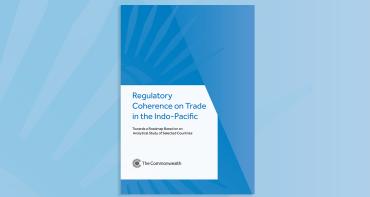“Landmark publication” gives insight to developing country investment negotiators
A new publication by the Commonwealth that provides tips for manoeuvring the complex web of international investment agreements for developing country negotiators will be required reading for law students at the University of the West Indies, St Augustine Campus in Trinidad and Tobago.
The handbook, titled, “Integrating Sustainable Development into International Investment Agreements: A Guide for Developing Countries Negotiators”, was launched on 29 October 2012, during the Sixth Forum of Developing Country Investment Negotiators in Port of Spain, Trinidad and Tobago.
Launching the publication, Trinidad and Tobago’s State Minister for Finance and the Economy, Rudranath Indarsingh, welcomed the idea to use the guide as a teaching tool, saying it will produce a critical mass of professionals with skills in trade and investment negotiations.
“I was delighted to learn that the University of the West Indies campus in Trinidad and Tobago will be using this very important publication as a teaching tool. This is key in ensuring that the useful material contained in the guide has greater outreach, impact and application,” Mr Indarsingh said.
The minister said by producing the guide, the Commonwealth Secretariat had delivered on one of its key mandates - assisting member states to develop the required skills to effectively negotiate agreements and to also attract investments that provide meaningful sustainable development, growth and employment for the millions of Commonwealth citizens.
“Investments have to be people centred, meaningful to the rank and file of our society, and must accelerate growth with jobs, while taking into account environmental sustainability. This Commonwealth guide provides options on how to achieve all these. It is an important practical milestone that demonstrates the Commonwealth’s commitment to assisting its members,” Mr Indarsingh said.
Professor Kusha Haraksingh, the Dean of the Faculty of Law at the University of West Indies campus in Trinidad and Tobago, who was also present at the launch, said he found the guide a useful tool for teaching and research.
“The guide contains very relevant case studies, provisions and policy options. It also draws from a wide breadth of examples and situations that provide lessons about treaty making. We are pleased that we will be using it as a teaching tool at the university,” added Professor Haraksingh, who is also the chairman of the Caribbean Community (CARICOM) Competition Commission.
Acting head of International Trade and Regional Co-operation at the Commonwealth Secretariat, Veniana Qalo, managed the four-year project leading to the culmination of the guide.
She said one of the Commonwealth’s objectives is to be of service to member states through conducting research, analysis and advocacy to enable them to achieve economic growth and sustainable development.
Ms Qalo said the guide explains how international investment agreements can increase foreign investment flows that promote economic growth and sustainable development in developing countries.
She added that the guide can be used by countries negotiating bilateral investment treaties and various provisions may also be suitable for inclusion in economic partnership agreements, investment provisions in preferential trading agreements and other international agreements relating to investment.
“It outlines new provisions designed to preserve the ability of states to regulate investment in a manner that ensures foreign investment is harnessed to achieve development goals without creating strong disincentives to investment,” she said.
Dr Howard Mann, a senior international law adviser at the International Institute for Sustainable Development, described the Commonwealth guide as a “landmark publication that gives insight to developing country investment negotiators”.
Investment specialist at the CARICOM Secretariat, Dr Chantal Ononaiwu, welcomed the publication, saying that a key quality of the guide is that the final product benefitted and was enhanced by broad consultation.
“We know that the guide will be a valuable tool as we continue to negotiate investment agreements. We would like to endorse it,” she said.
On her part, Elizabeth Tuerk, an officer in charge of international investment agreements at the United Nations Conference on Trade and Development said the guide helps negotiators to ask the right questions and identifies best practices, putting sustainable development at the core.
Counsellor at Pakistan’s Mission to the World Trade Organization, Ahmed I. Aslam, said the guide is “timely, and I have found the trends it addresses helpful in the course of my work”.
You can order a copy of the guide from the Commonwealth’s online bookstore, https://publications.thecommonwealth.org/



